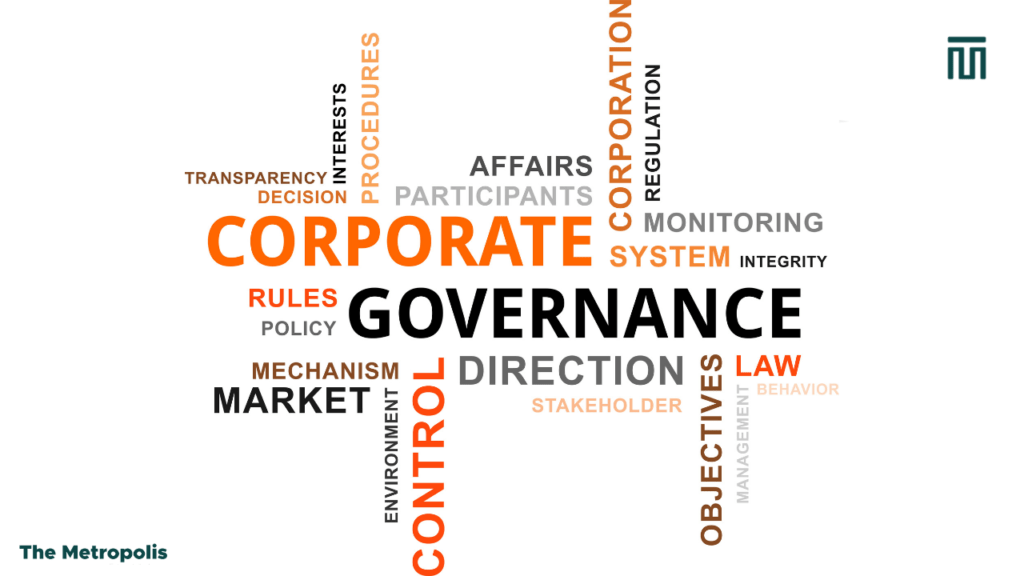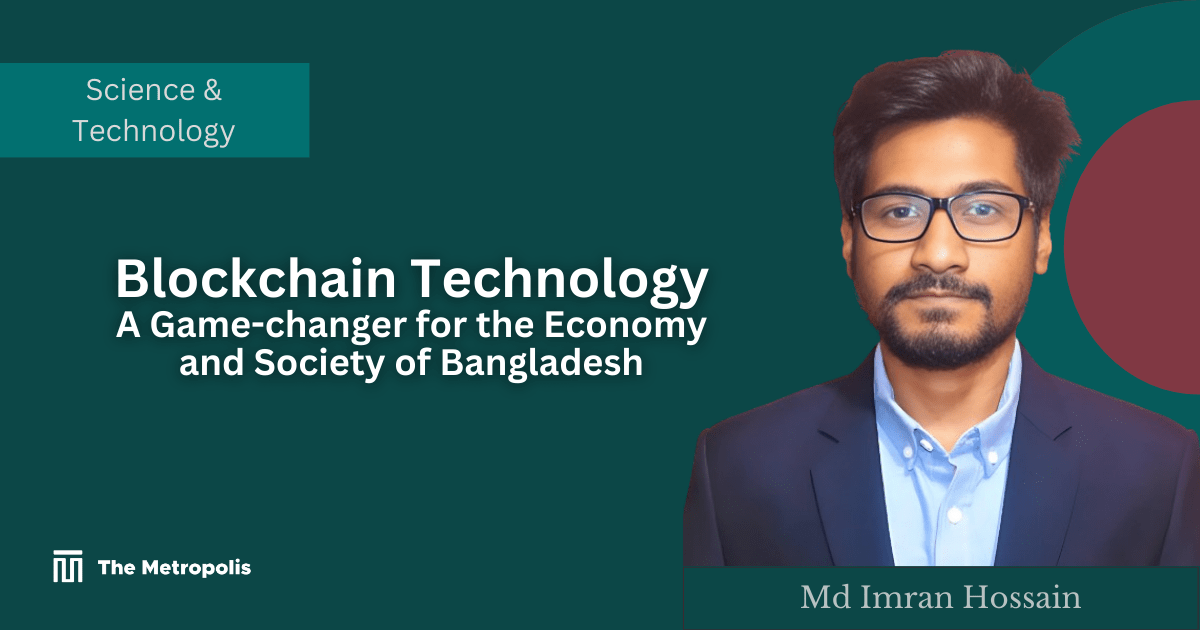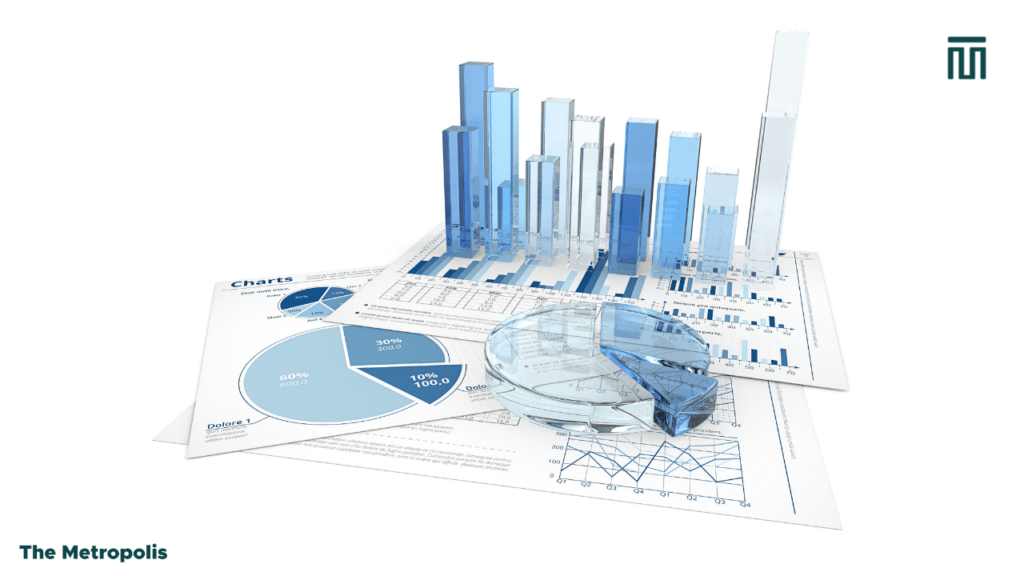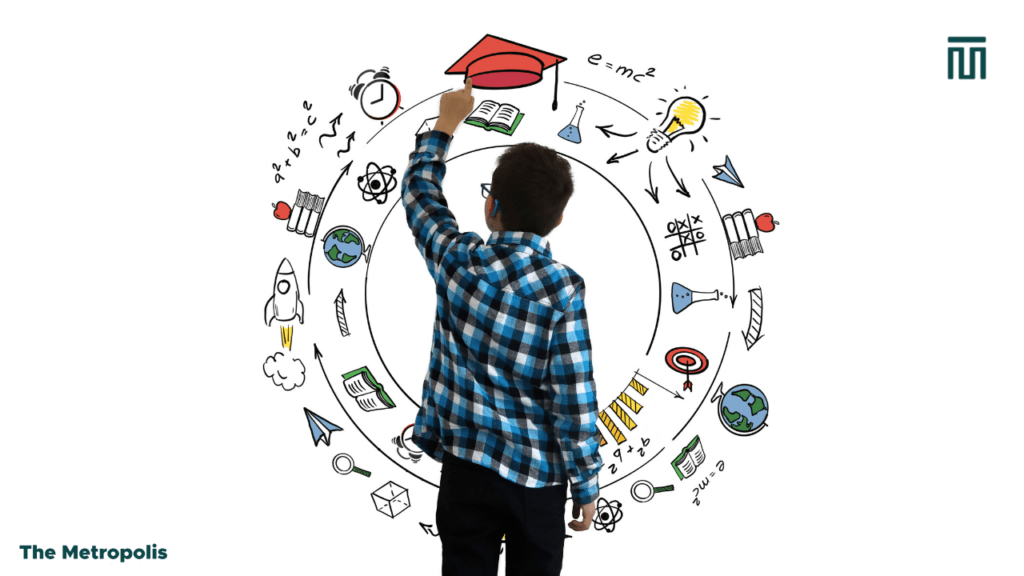Md Imran Hossain –
Imagine a world where you can access any public service with a click of a button, without any paperwork or hassle. You can send money to your family abroad in seconds, without paying high fees or waiting for days. Where you can track the origin and quality of the products you buy, without relying on third parties or labels. Where you can learn new skills and earn credentials that are recognized and valued by anyone, anywhere.
This is not a fantasy. This is the world that blockchain technology can create for Bangladesh, a country that has achieved remarkable economic and social progress in recent decades, but still faces many challenges that hinder its full potential. Blockchain technology is a revolutionary innovation that can change the way we store and share data, exchange value, and collaborate across different sectors and domains.
Blockchain technology is like a digital ledger that records data in blocks that are linked together by cryptography. The ledger is distributed and stored by a network of computers that follow a set of rules to agree on the order and validity of the blocks. This makes the ledger secure, transparent, and immutable: no one can tamper with or delete the data once it is recorded on the blockchain. Blockchain technology also enables smart contracts and 10digital assets: self-executing agreements and representations of value that can be programmed and exchanged on the blockchain without intermediaries.
Blockchain technology has many applications and benefits for various sectors in Bangladesh, such as e-governance, finance, supply chain, and education. In this article, we will explore some of these applications and benefits, and suggest some steps that Bangladesh should take to embrace blockchain technology and become a leader in the Fourth Industrial Revolution.

E-Governance: Making Public Services Faster, Cheaper, and Better
E-Governance is the use of information and communication technologies to improve the delivery and efficiency of public services, to enhance citizen participation and empowerment, and to promote transparency and accountability in governance processes. E-Governance can improve the quality and accessibility of public services, reduce costs and corruption, increase trust and satisfaction among citizens, and foster social inclusion and innovation.
Blockchain technology can make e-governance even better by providing a secure, transparent, and immutable platform for storing and sharing data among different government agencies and stakeholders. Blockchain technology can also enable smart contracts that can automate transactions and enforce rules without intermediaries.
Some of the possible applications of blockchain technology for e-governance in Bangladesh are:
- Digital identity: Blockchain technology can provide a decentralised and verifiable system for issuing and managing digital identities for citizens, businesses, and other entities. Digital identities can enable access to various public services, such as health care, education, social welfare, banking, etc., without requiring physical documents or intermediaries. Digital identities can also protect the privacy and security of personal data by allowing users to control what information they share and with whom.
- Land registration: Blockchain technology can provide a transparent and immutable system for recording and verifying land ownership and transactions. Land registration is a major challenge in Bangladesh due to lack of proper documentation, corruption, forgery, disputes, etc. Blockchain technology can reduce these problems by creating a single source of truth for land records that can be accessed and updated by authorised parties in real time. Blockchain technology can also enable smart contracts for facilitating land transactions without involving middlemen or lawyers.
- Voting: Blockchain technology can provide a secure and auditable system for conducting electronic voting. Voting is a fundamental right and duty of citizens in a democracy. However, voting is often plagued by issues such as low turnout, fraud, manipulation, etc. Blockchain technology can improve voting by allowing citizens to cast their votes remotely and anonymously using their digital identities, while ensuring the integrity and transparency of the voting process. Blockchain technology can also enable instant and verifiable results, reducing the need for manual counting or recounting.
Finance: Making Money Transfer Easier, Faster, and Cheaper
Finance is the management of money and other assets by individuals, businesses, and governments. Finance involves various activities such as saving, investing, borrowing, lending, transferring, etc. Finance plays a vital role in economic development, poverty reduction, and social welfare.
Blockchain technology can transform finance by providing a decentralised, peer-to-peer, and trustless platform for exchanging value without intermediaries. Blockchain technology can also enable new forms of digital assets, such as cryptocurrencies, tokens, stablecoins, etc., that can offer more choice, efficiency, and inclusion for financial users. Blockchain technology can also enable smart contracts that can automate financial transactions and enforce rules without intermediaries.
Some of the possible applications of blockchain technology for finance in Bangladesh are:
- Remittances: Remittances are money transfers sent by migrant workers to their families or communities in their home countries. Remittances are a major source of income and foreign exchange for many developing countries, including Bangladesh. However, remittances are often costly, slow, and risky due to intermediaries such as banks or money transfer operators that charge high fees, impose limits, and require identification documents. Blockchain technology can reduce these problems by enabling direct, fast, and cheap remittances using cryptocurrencies or tokens that can be exchanged for local currencies at local agents or merchants.
- Microfinance: Microfinance is the provision of small loans or other financial services to low-income individuals or groups who lack access to formal financial institutions. Microfinance can empower poor people to start or expand their businesses, improve their livelihoods, and reduce their vulnerability to shocks. However, microfinance faces many challenges such as high operational costs, low repayment rates, lack of transparency, etc. Blockchain technology can improve microfinance by enabling peer-to-peer lending platforms that can connect borrowers and lenders directly without intermediaries. Blockchain technology can also enable smart contracts that can automate loan disbursement, repayment, and enforcement without intermediaries.
- Financial inclusion: Financial inclusion is the access to and use of formal financial services by all segments of society, especially the poor and marginalised. Financial inclusion can enhance economic growth, poverty reduction, and social welfare by enabling people to save, invest, borrow, insure, etc. However, Financial inclusion is low in many developing countries due to lack of infrastructure, awareness, trust, etc. Blockchain technology can increase financial inclusion by providing a universal platform for accessing various financial services using digital identities and assets that do not require physical presence or documentation. Blockchain technology can also enable new forms of financial services that cater to the specific needs and preferences of different segments of society.
Supply Chain: Making Products Traceable, Quality, and Sustainable
Supply chain refers to the network of activities involved in producing and delivering goods or services from suppliers to customers. Supply chain involves various processes such as sourcing, manufacturing, transportation, distribution, quality control, inventory management, etc. Supply chain plays a crucial role in economic development, competitiveness, and customer satisfaction.
Blockchain technology can improve supply chain by providing a transparent, immutable, and traceable platform for recording and sharing data among different supply chain actors. Blockchain technology can also enable smart contracts that can automate transactions and enforce rules without intermediaries. Blockchain technology can also enable new forms of digital assets, such as tokens, that can represent physical goods or services on the blockchain.
Some of the possible applications of blockchain technology for supply chain in Bangladesh are:
- Agriculture: Agriculture is one of the main sectors of Bangladesh’s economy, providing employment, income, and food security for millions of people. However, agriculture faces many challenges such as low productivity, poor quality, high wastage, lack of market access, etc. Blockchain technology can enhance agriculture by enabling farmers to record and verify their production data on the blockchain, such as crop type, quantity, quality, location, etc. This data can be shared with other supply chain actors, such as buyers, processors, distributors, retailers, consumers, etc., to increase trust, transparency, and efficiency. Blockchain technology can also enable smart contracts that can facilitate payments, incentives, insurance, etc., without intermediaries. Blockchain technology can also enable tokens that can represent agricultural products or services on the blockchain, such as seeds, fertilizers, machinery, training, etc., that can be exchanged among supply chain actors.
- Textile: Textile is one of the main export sectors of Bangladesh’s economy, generating revenue, employment, and foreign exchange. However, textile faces many challenges such as low quality, high environmental impact, poor working conditions, lack of traceability, etc. Blockchain technology can improve textiles by enabling manufacturers to record and verify their production data on the blockchain, such as fabric type, quantity, quality, origin, etc. This data can be shared with other supply chain actors, such as buyers, auditors, regulators, consumers, etc., to increase trust, transparency, and efficiency. Blockchain technology can also enable smart contracts that can facilitate payments, compliance, etc., without intermediaries. Blockchain technology can also enable tokens that can represent textile products or services on the blockchain, such as certifications, labels, warranties, etc., that can be exchanged among supply chain actors.
Education: Making Learning Accessible, Recognized, and Lifelong
Education refers to the process of acquiring knowledge, skills, values, and attitudes for personal and social development. Education is essential for human capital formation, economic growth, social cohesion, and civic participation. Education also contributes to achieving the SDGs by addressing various challenges such as poverty, inequality, health, environment, etc.
Blockchain technology can improve education by providing a secure, transparent, and verifiable platform for storing and sharing educational data among different stakeholders. Blockchain technology can also enable new forms of digital assets, such as credentials, certificates, badges, etc., that can represent educational achievements or competencies on the blockchain.
Some of the possible applications of blockchain technology for education in Bangladesh are:
- Credential verification: Blockchain technology can provide a decentralised and tamper-proof system for issuing and verifying credentials such as degrees, diplomas, certificates, transcripts, etc. Credential verification is a challenge in Bangladesh due to lack of standardisation, fraud, forgery, etc. Blockchain technology can reduce these problems by creating a single source of truth for credentials that can be accessed and verified by authorised parties in real time. Blockchain technology can also enable self-sovereign identity, which allows learners to own and control their credentials and share them with whom they choose.
- Lifelong learning: Blockchain technology can provide a lifelong learning platform that can record and recognize informal and formal learning experiences throughout one’s life. Lifelong learning is important for personal and professional development, especially in the context of rapid technological and social changes. However, lifelong learning faces many challenges such as lack of recognition, portability, and accessibility of learning outcomes. Blockchain technology can overcome these challenges by creating a comprehensive and portable learning portfolio that can showcase one’s skills and competencies across different domains and contexts. Blockchain technology can also enable micro-credentials, which are granular and modular credentials that can validate specific learning outcomes or competencies.
- Digital literacy: Blockchain technology can provide a digital literacy platform that can educate and empower learners about the basics of blockchain technology and its applications. Digital literacy is essential for participating in the digital economy and society, especially in the context of 4IR. However, digital literacy is low in Bangladesh due to lack of awareness, resources, and opportunities. Blockchain technology can enhance digital literacy by providing interactive and engaging learning materials, such as games, simulations, quizzes, etc., that can teach learners about the concepts, principles, and benefits of blockchain technology. Blockchain technology can also enable peer-to-peer learning networks, which can connect learners with mentors, experts, and peers who can support their learning journey.
Conclusion:
Blockchain technology is a powerful tool that can create a lot of potential for Bangladesh to address its existing challenges and to prepare for the future 4IR. However, blockchain technology is not a silver bullet that can solve all problems by itself. Blockchain technology requires a supportive ecosystem that involves various stakeholders such as government, private sector, academia, civil society, etc., who can collaborate and coordinate to develop and implement blockchain solutions that are relevant, effective, and sustainable for Bangladesh. Blockchain technology also requires a conducive environment that involves various factors such as infrastructure, regulation, policy, culture, etc., that can enable and facilitate the adoption and diffusion of blockchain solutions in Bangladesh.
Therefore, we recommend that Bangladesh should take proactive steps to explore and embrace blockchain technology by:
- Developing a national blockchain strategy that outlines the vision, goals, priorities, and roadmap for blockchain development and adoption in Bangladesh.
- Establishing a national blockchain platform that provides a common infrastructure, standards, and guidelines for developing and deploying blockchain solutions in Bangladesh.
- Creating a national blockchain innovation hub that fosters research, development, and innovation in blockchain technology and its applications in Bangladesh.
- Building a national blockchain community that engages and empowers various stakeholders such as government, private sector, academia, civil society, etc., to collaborate and coordinate on blockchain initiatives in Bangladesh.
- Enhancing a national blockchain capacity that educates and trains various stakeholders such as policy makers, developers, users, etc., on the basics, benefits, and best practices of blockchain technology in Bangladesh. By taking these steps, Bangladesh can leverage blockchain technology to transform its economy, society, and governance, and to become a leader in the 4IR.
Below are the sources used to write this article:
- National Blockchain Strategy: Bangladesh
- https://www.tbsnews.net/tech/blockchain-technology-bangladesh-perspective-44271
- https://www.simplilearn.com/tutorials/blockchain-tutorial/blockchain-technology#:~:text=A%20blockchain%20platform%20is%20a,consensus%20among%20the%20network%20participants.
- https://en.wikipedia.org/wiki/Blockchain
Md Imran Hossain is the Senior Executive (IT) at The Metropolis.







